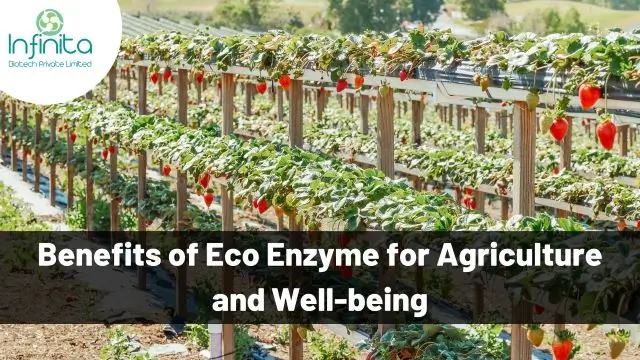In today’s world, where sustainable practices and holistic well-being are gaining prominence, the eco enzyme has emerged as a remarkable solution with numerous benefits for both agriculture and overall well-being. This powerful organic concoction offers a multitude of advantages, ranging from environmental benefits to improved plant growth and personal health benefits. In this article, we will delve into the various advantages of eco enzymes and explore their potential applications in agriculture and well-being.
Introduction
An eco enzyme, also known as a fruit enzyme, is a natural and eco-friendly solution produced by fermenting organic waste materials such as fruits, vegetables, and brown sugar. The fermentation process yields a liquid rich in beneficial microorganisms and enzymes, which possess remarkable properties that can be harnessed to improve agriculture and well-being. Let’s take a closer look at the advantages it offers in both these domains.
Environmental Benefits of Eco Enzyme
One of the key advantages of eco enzyme lies in its environmental benefits. By utilizing eco enzymes in agricultural practices, the dependence on chemical fertilizers and pesticides can be significantly reduced.
By reducing the adverse effects of detrimental chemicals on the environment, this decrease simultaneously promotes the preservation of soil health and fertility.
Furthermore, eco enzyme plays a vital role in preventing water pollution. Traditional farming methods often result in chemical runoff, which contaminates water bodies and harms aquatic ecosystems. On the flip side, an eco enzyme aids in the decomposition of pollutants and the elimination of harmful substances, diminishing the potential for water pollution and fostering a more wholesome environment for all living beings.
Agricultural Benefits of Eco Enzyme
When it comes to agriculture, eco enzyme offers a plethora of benefits that promote plant growth, improve yield, and enhance overall crop quality. One of its notable advantages is the enhancement of nutrient absorption. The enzymes present in eco enzymes break down organic matter, releasing essential nutrients that become readily available for plants to absorb. This improves nutrient uptake efficiency, leading to healthier and more robust crops.
Additionally, eco enzyme exhibits natural pest and disease control properties. The enzymes and microorganisms present in eco enzymes create an unfavorable environment for pests and harmful pathogens, reducing the need for chemical pesticides. This approach not only ensures a safer and healthier harvest but also contributes to the sustainability of agriculture by minimizing chemical inputs.
Health Benefits of Eco Enzyme
Apart from its agricultural benefits, an eco enzyme also offers numerous advantages for personal well-being. One of its notable health benefits is its ability to boost the immune system. The enzymes and beneficial microorganisms present in eco enzyme work synergistically to enhance the body’s immune response, thereby reducing the risk of infections and diseases.
Moreover, eco enzyme possesses detoxification and cleansing properties. When consumed, it aids in flushing out toxins from the body, promoting detoxification and improving overall metabolic function. This cleansing effect can positively impact digestion, skin health, and overall vitality.
Application Methods of Eco Enzyme
To harness the benefits of eco enzymes effectively, various application methods can be employed. One common method is spray application, where a diluted eco enzyme solution is sprayed directly on the plants’ leaves. This allows for easy absorption of enzymes and nutrients, providing an immediate boost to plant health.
Another method is soil treatment, where an eco enzyme is applied directly to the soil. This method improves soil structure, increases microbial activity, and enhances nutrient availability for plants. It can be particularly beneficial for restoring degraded soils and promoting long-term sustainability in agriculture.
Additionally, eco enzymes can be utilized in composting to accelerate the decomposition process and enhance the quality of compost. Adding eco enzyme to compost piles helps break down organic matter faster, resulting in nutrient-rich compost that can be used to enrich soil fertility.
Case Studies and Success Stories
Numerous case studies and success stories highlight the remarkable benefits of eco enzymes in agriculture and well-being. Farmers who have adopted eco enzymes in their practices have reported improved crop yields, reduced dependency on chemical inputs, and enhanced soil health. These positive outcomes have not only translated into economic benefits but have also contributed to the ecological balance of their farming systems.
Individuals who have incorporated eco-enzymes into their daily routines have experienced improvements in their overall well-being. From increased energy levels to better digestion and healthier skin, the positive impact of eco enzymes on personal health is evident in many testimonials.
Safety and Sustainability
One of the remarkable aspects of an eco enzyme is its safety and sustainability. Unlike chemical fertilizers and pesticides, an eco enzyme is non-toxic and poses no harm to humans, animals, or the environment. This makes it an ideal choice for those seeking sustainable alternatives in agriculture and personal well-being.
Moreover, the production of eco enzymes promotes waste reduction and recycling. By utilizing organic waste materials, eco-enzyme production contributes to a circular economy, minimizing the environmental burden associated with waste disposal.
Conclusion
Eco enzyme offers a wide range of benefits for agriculture and well-being. From reducing chemical usage and improving soil health to promoting plant growth and boosting personal well-being, an eco enzyme is a versatile solution with immense potential. By embracing eco enzymes in agricultural practices and personal routines, we can contribute to a more sustainable and healthier future.

 Summarize this Article with AI
Summarize this Article with AI






